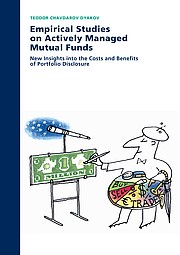Empirical Studies on Actively Managed Mutual Funds: New Insights into the Costs and Benefits of Portfolio Disclosure Defended on Friday, 17 January 2014
This dissertation bundles three empirical studies on actively managed mutual funds. These studies provide new insights into the costs and benefits of portfolio disclosure and shed more light into the question whether mutual fund investors have an information advantage over other market participants. Chapter 2 develops a simple trading strategy which front-runs the anticipated forced sales by mutual funds experiencing extreme capital outflows. The findings in this chapter suggest that publicly available information on fund holdings exposes mutual funds in distress to predatory trading. Chapter 3 studies investors sophistication and shows that mutual fund investors are probably more sophisticated than previously thought. The evidence in this chapter suggests that investors use portfolio holdings information in order to infer managerial skill and benefit from shifting capital towards skilled fund managers. Thus, while chapter 2 provides evidence for the potential costs of portfolio disclosure, chapter 3 quantifies the benefits from the actual use of portfolio holdings information by mutual fund investors. Chapter 4 uses disclosed fund holdings in order to study the information content of mutual funds' trades. The study documents that prior to 2001, stocks purchased by funds outperform stocks they sell. However, the opposite happens after 2001. The findings in this chapter suggest that mutual fund managers might have lost their information advantage over time. An important, although not sole reason for this effect is reduction in selective access to firm information following the implementation of Regulation Fair Disclosure in 2001.
Keywords
mutual funds; portfolio disclosure; front-running; managerial skill; fund flows













